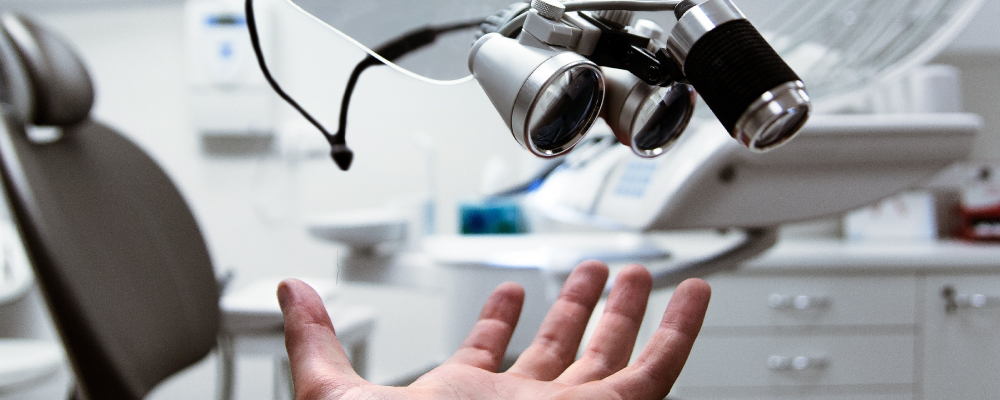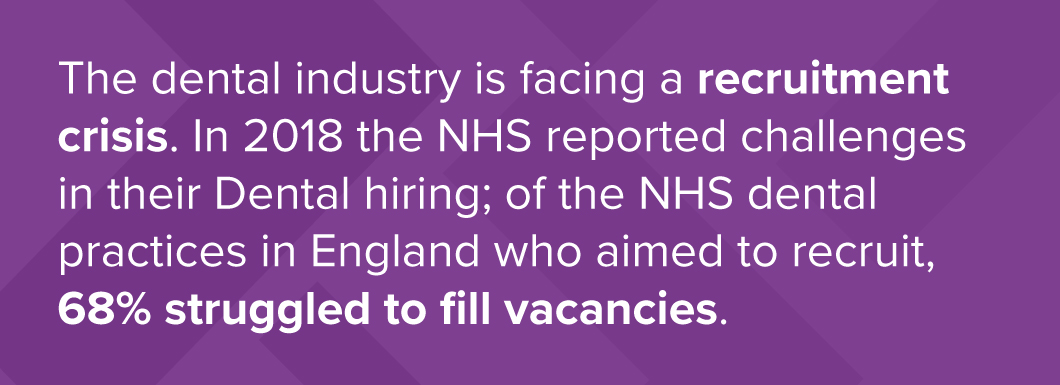Drop off your CV
We'd love to hear from you. Send us your CV and one of our specialist consultants will be in touch.

There have been rapid advancements in digital technology in the Dental industry, with the increased use of CAD/CAM and other alternative digitalisations becoming a vital part of patient and practice management.
A report from the BDJ (British Dental Journal) stated that “technology has a particular resonance with dentistry, with advances in 3D imaging and modelling technologies and the relatively long history of the use of CAD/CAM in dentistry, it will become of increasing importance”.
With 3D printing, Artificial Intelligence and even Augmented Reality being hailed as the new era of dentistry, how is this technology affecting current professionals and the future talent required for the industry?

The dental industry is facing a recruitment crisis. In 2018 the NHS reported challenges in their Dental hiring; of the NHS dental practices in England who aimed to recruit, 68% struggled to fill vacancies.
On top of this, retention of dental professionals has become a key issue, with the British Dental Association (BDA) reporting that 59% of NHS dentists are planning to leave the profession in the next 5 years.
This has led to an impact on patients; a 2017 report from BBC News analysed 2,500 practices in the UK and found that 48% were not accepting new adult patients and 40% were turning new child patients away.
Investment in Dental Technology could be the change the industry needs, to both find, and importantly, retain top talent.
The emergence of new dental technologies aims to make dental treatment not only higher quality and more innovative, but quicker and easier to carry out. Digital technology can take some of the pressure off strained dental professionals, improve patient satisfaction with their current treatments, and provide the option of new, alternative treatments.
However, with new technology comes the need for new skills. As the digital side of Dentistry advances, skills gaps can be left where current Dental professionals simply do not have the training or knowledge needed to utilise these technologies. Dental practices will need to adapt the way they recruit new talent, and the skills they look for when hiring.
For example, by employing visualisation technology, Dental Technicians can take a much more active role in procedures which were previously done exclusively by Dentists. Creating virtual models of a patient’s jaw to demonstrate the impact of their treatment, is something which can be carried out by a trained Dental Technician, rather than relying solely on the Dentist.
Intraoral scanners are also saving dentists both time and money – digitising the impression process saves on materials and means the process can take as little as five minutes! Using this technology allows dentists to see more patients per day, and reduces the pressure of getting through lengthy waiting lists.
Patients’ needs and expectations and the shift in industry focus are likely to change the industry’s demand for talent and specialist skillsets. There will be a need for candidates with a variety of skills to support the technological advancements within practices. A statement from the Department of Health England stated that there will be a “possible impact of changes to policy on training and education in the UK for the General Dental Council”.
To accommodate the changes to the Dental industry, incorporating the advancements in technology into the education and training of new industry professionals is paramount. Not only will existing roles within Dentistry need to adapt, but new roles will emerge with a completely new skillset – opening up the Dental industry as a career choice for candidates with more technical backgrounds.
From a financial perspective, Dental technology can also increase profits and lead to growth in businesses, creating more opportunities for progression within the industry. An online interview with DDS and business owner William Huntzinger based in Ohio – USA, reported a successful ROI after investing in dental laser technology Solea. He stated that his practice saw a 13% increase in restorative production in one year, resulting in a further investment of 4 more of these digital products.
Senior candidates need to see growth and potential if they are to invest their skills and career into a business. Investment in digital technology reassures candidates that the business is not only forward-thinking but is going to thrive in an ever-changing market.
Whilst digital technology in the Dental industry comes with its challenges, it is also an opportunity for professionals to adapt and develop new skills to keep them ahead of the curve as the industry evolves. Technology creates new opportunities for people with different skills and knowledge to join the profession and attract talent into an industry that historically has struggled to do so.
Just like the medical industry is profiting from the incorporation of digital technology in their practices, the dental industry will benefit too. Dentistry is an industry which should be inclined to employ technological innovations in order to achieve growth and success. The investment in technology will ultimately result in the growth of business, meaning there will be a demand for new talent with specialist skillsets in the industry.
CSG’s talented dental head hunters are focused on securing the best quality talent with the right skill sets to drive dental organisations forwards in the progressive dental technology market. If you would like to discuss this topic and how your company can benefit from our services, I can be reached at +44 (0) 1133 933165 or toby.lawton@csgtalent.com
Dentistry iQ, The dental hygiene job market: Have we finally turned a corner?
Dentistry iQ, NHS dentistry experiencing a recruitment crisis
Core 3D Centres, The Dental Technician’s Role in Digital Technology
MarketsANDMarkets, Dental equipment market
Dentistry iQ, How to keep up with your ever-increasing changes in dental technology
Dental Economics, Investing in the latest technology in the later years of practice
Dentistry.co.uk, Five reasons to own an intraoral scanner
British Dental Journal, Perspective: The dental recruitment crisis
British Dental Journal, 3D printing in dentistry
NCBI, Dentists’ opinion on using digital technologies in dental practice
NHS, Advancing Dental Care: Education and Training Review
Department of Health, Liberating the NHS: Developing the healthcare workforce
General Dental Council, Changes to dental provision in the UK and the implications on the General Dental Council
3D Printing Industry, how 3D printing has changed dentistry